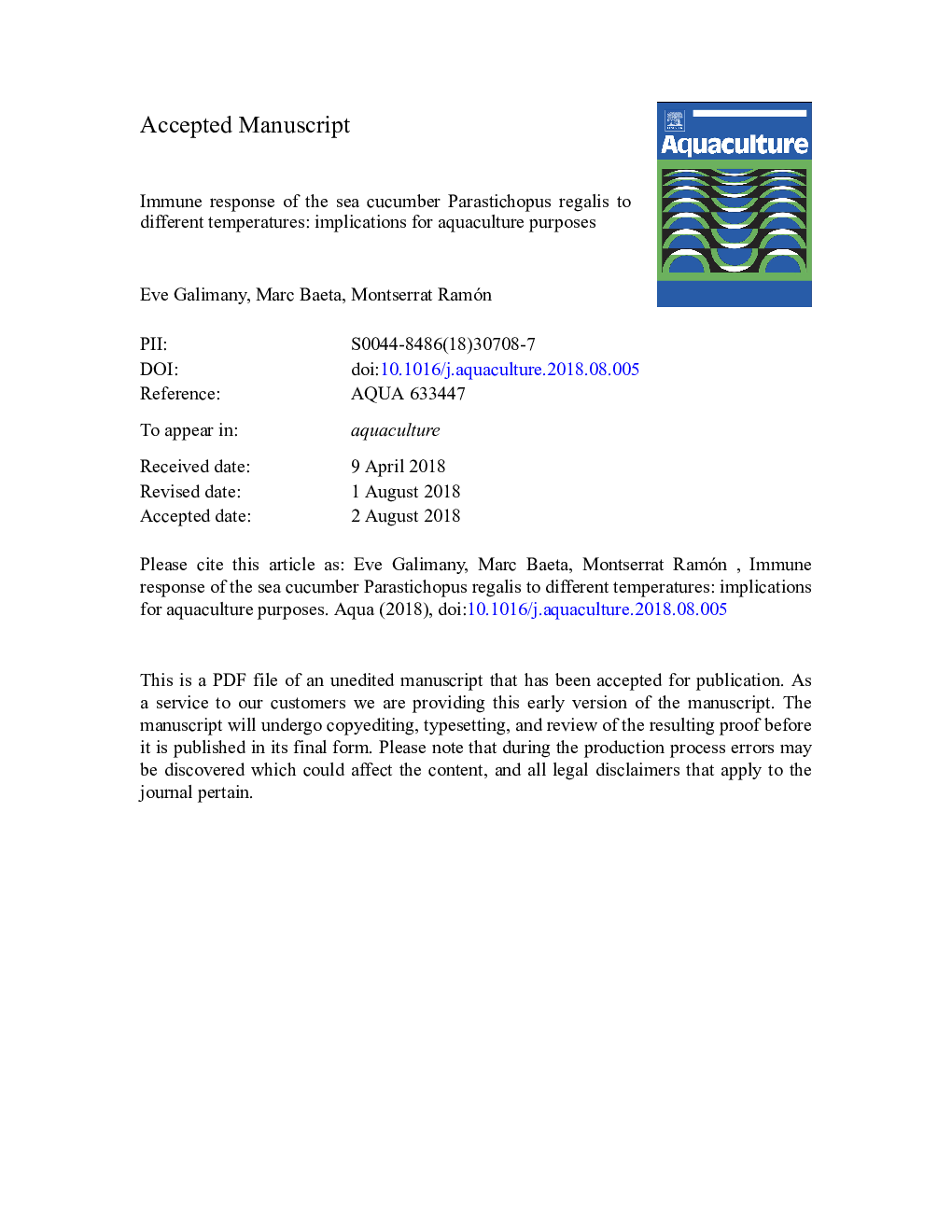| کد مقاله | کد نشریه | سال انتشار | مقاله انگلیسی | نسخه تمام متن |
|---|---|---|---|---|
| 8492998 | 1552791 | 2018 | 26 صفحه PDF | دانلود رایگان |
عنوان انگلیسی مقاله ISI
Immune response of the sea cucumber Parastichopus regalis to different temperatures: implications for aquaculture purposes
دانلود مقاله + سفارش ترجمه
دانلود مقاله ISI انگلیسی
رایگان برای ایرانیان
کلمات کلیدی
موضوعات مرتبط
علوم زیستی و بیوفناوری
علوم کشاورزی و بیولوژیک
علوم آبزیان
پیش نمایش صفحه اول مقاله

چکیده انگلیسی
Interest in sea cucumber aquaculture is increasing worldwide for both consumption and ecological purposes. In the NW Mediterranean there is only one commercially exploited and edible sea cucumber, Parastichopus regalis, whose muscles are considered a culinary delicacy. With the aim to understand the potential for P. regalis to be grown in aquaculture facilities, we studied its resistance to the high temperature conditions that characterize the Mediterranean mariculture facilities. The immune response of adult P. regalis exposed to different temperatures (18â¯Â°C, 23â¯Â°C and 28â¯Â°C) was compared to the response to its natural environmental conditions (13â¯Â°C) during a 2-week period. Moreover, the immune response after a 1-week recovery period was also investigated. Mortality and coelomocyte characteristics and functions were analyzed, i.e. phagocytosis and dead coelomocytes. Results showed that 90% of the sea cucumbers exposed to 28â¯Â°C died before 48â¯h and at 23â¯Â°C they had 50% survivorship after 2â¯weeks of exposure. The proportion of coelomocyte types did not change during the study for animals exposed to 18â¯Â°C or 23â¯Â°C. Coelomocyte density increased throughout the experiment at 23â¯Â°C for sea cucumbers exposed to both control and high temperature. However, high temperature P. regalis exposed to 23â¯Â°C had significantly less phagocytic and dead coelomocytes during the two weeks of exposure. After a 1-week recovery period, the differences found between temperatures disappeared, except that the phagocytic capacity of the coelomocytes exposed to 23â¯Â°C was still lower than controls. In summary, P. regalis seems to have a maximum thermal tolerance below 23â¯Â°C, above which their survival is compromised. Thus, the use of P. regalis for aquaculture purposes should be constrained to areas where temperatures do not exceed 23â¯Â°C throughout the year.
ناشر
Database: Elsevier - ScienceDirect (ساینس دایرکت)
Journal: Aquaculture - Volume 497, 1 December 2018, Pages 357-363
Journal: Aquaculture - Volume 497, 1 December 2018, Pages 357-363
نویسندگان
Eve Galimany, Marc Baeta, Montserrat Ramón,